
Learn about Centennial Townhomes


Visit us on Facebook and Twitter

Learn about Centennial Townhomes |


Visit us on Facebook and Twitter |

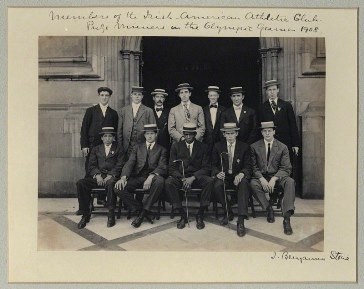 Strong Hand Forever: Ray Ewry & the 1908 Olympics
Strong Hand Forever: Ray Ewry & the 1908 Olympics
Cindy Eberts
Retired Purdue Professor
Date: Wednesday, February 18
Time: 6:30 pm
Place: LUM Ray Ewry Youth Center, 525 N 4th Street, Lafayette
Rather than jump for the Ivy League, Anglo-Saxon-only athletic club in the 1908 Olympic Games, Ray Ewry, with his international reputation as a record breaking athlete, chose to join the New York City Irish-American Athletic Club. The NYC IAAC allowed anyone to join including American Indians, African-Americans, Jews, and Irish. As a member of the IAAC, Ewry was present when the ethnically diverse US Olympic team ran circles around the British Empire and broke the US athletic color barrier. The athletes from the IAAC outperformed everyone in the 1908 Olympics leaving us with an unmistakable message of personal courage, racial inclusion, and faith.
Professor Eberts shared the stories behind this vintage photo of Ray Ewry (first row, second from left) and his fellow athletes -- as well as stories about Ray Ewry's 1908 Olympic experience.
One of Ewry's early childhood homes in the late 1800s was 425 N. 5th
St. This address is now a beautifully-restored historic rowhouse in
the Historic Centennial Neighborhood.

 Imagination Station, 600 N. Fourth St., kicked off its season with a
free grand reopening from 10:00 am to 3:00 pm Saturday, February 7.
Imagination Station, 600 N. Fourth St., kicked off its season with a
free grand reopening from 10:00 am to 3:00 pm Saturday, February 7.
MISSION -- Imagination Station provides hands-on learning experiences in science, technology, and engineering in order to strengthen the scientific literacy of children and families in the Greater Lafayette Community.
VISION -- Through community-led exhibits and programs, Imagination Station endeavors to complement traditional education experiences and inspire the innovators of tomorrow.
HISTORY -- The Association for Science, Space, Engineering, and Technology (ASSET) was founded as a non-profit in 1992. The Imagination Station was developed by ASSET to provide a facility with activities and exhibits to teach children and adults alike about space, science, and technology. The Imagination Station settled into its current location in 1999, when the building was donated by the Indiana Gas Co. (Indiana Gas). Guest of honor, astronaut Mark Brown was on hand to dedicate the building on March 5, 1999. Over the years, the exhibits and building have changed, but the desire to inspire curiosity in the sciences to our youth remains.
Imagination Station is open from 10 am to 1 pm on Tuesdays and
Fridays, and from 10 am to 3 pm Saturdays. Admission is $4 for
ages 3 to 16, $2 for age 17 and older, and free for under age 3.
The website is www.imagination-station.org.

This year's Historic Centennial Neighborhood Association's annual meeting was held at Tippecanoe Arts Federation (Wells Cultural Center) on Thursday February 5 at 7:00 pm. All neighbors, owners, renters, and business owners were invited as well as anyone else who wanted to hear more about our neighborhood. We began with a social time with refreshments.
The program featured a presentation on the Centennial Townhomes project. The developer, John Teibel, provided an update on the ongoing construction of urban housing on the former site of Midwest Rentals on N. 5th Street between Brown and Cincinnati Streets. The construction resulted from a unique partnership of the Centennial Neighbors Investment Group, LLC, City of Lafayette Redevelopment Commission, and Lafayette Urban Enterprise Association. The private/public partnership purchased the land and selected Mr. Teibel to execute on the site the longstanding goal of the Centennial Neighborhood for market-rate, owner-occupied urban housing designed to complement the surrounding historic architecture.

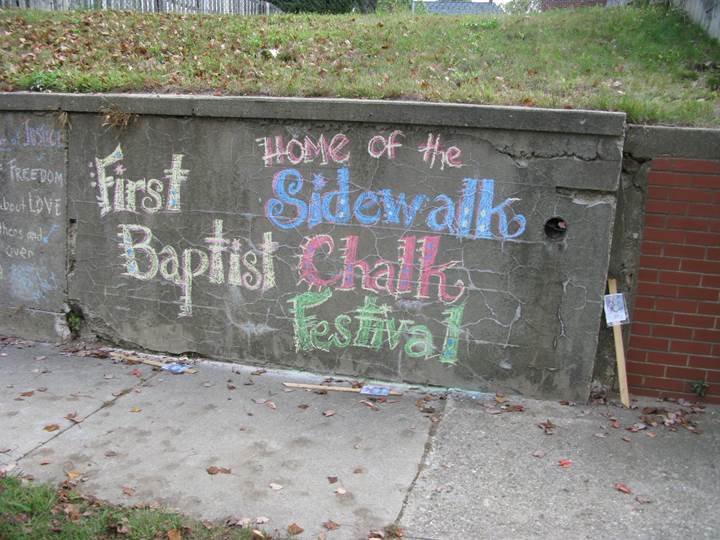 The 7th Annual Sidewalk Chalk Festival was September 3-7, 2014 at
the corner of 7th and North Streets.
The 7th Annual Sidewalk Chalk Festival was September 3-7, 2014 at
the corner of 7th and North Streets.
Volunteers helped on the days of the event with water and chalk distribution, artist encouragement, crowd control, and generally having a good time with kids from all over the community.
If you or someone you know would like to participate in 2015, please email
Harry Mohler, hlm@hlmohler.com, to reserve a square of sidewalk.
The event is free to the artists. However, space is limited.

The Eighth Annual Hollyhock Festival was Saturday, June 21, 11:00 am - 2:00 pm at Centennial Park (at the corner of 6th and Brown in Lafayette, Indiana).
Mayor Roswarski joined us and we dedicated a yellow poplar tree in honor of Harold Fannon, a long-time champion of city neighborhoods and a former Lafayette City Councilman. The tree has a silver leaf plaque commemorating him.
The fun included hot dogs, chips, drinks, games for children, and a coloring contest. There was ice cream courtesy of the First Baptist Church. Live music with J.T. Hickman was featured.
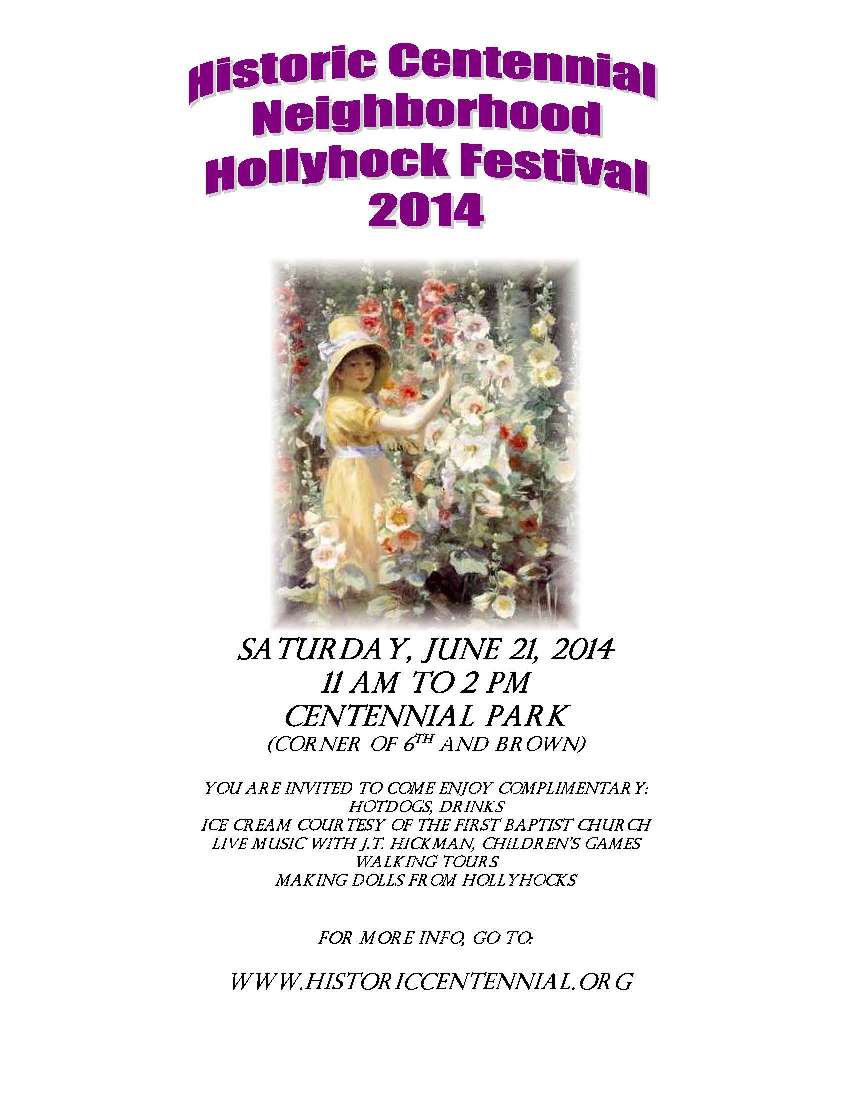
A PDF file of this poster for printing (or if the poster above is hard to read on your computer).

 There is now a development agreement for the Centennial Townhomes
property. John Tiebel, a local developer, has agreed to construct 14
two-story townhomes on the half block on Fifth Street between Brown
and Cincinnati streets.
There is now a development agreement for the Centennial Townhomes
property. John Tiebel, a local developer, has agreed to construct 14
two-story townhomes on the half block on Fifth Street between Brown
and Cincinnati streets.
Each of the brick townhomes will be approximately 1600 square feet and will have two bedrooms and two bathrooms. Along the alley behind the townhomes, each residence will have a two-car garage. It will look similar to the brownstones across the street, but a little more like the rowhouses that are to the south of the site. It will fit the historic character of the neighborhood and each townhome will have a brick exterior.

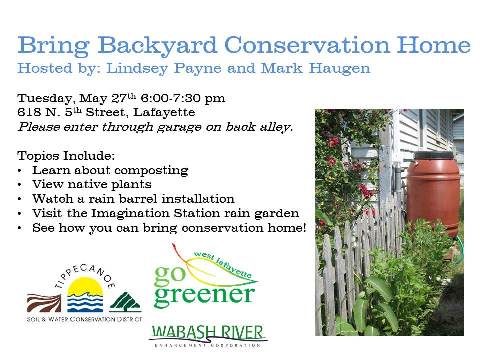 Composting and Rain Barrel Installation Workshop
Composting and Rain Barrel Installation WorkshopTopics included:

This year's Historic Centennial Neighborhood Association's annual meeting was held at Tippecanoe Arts Federation (Wells Cultural Center) on Monday February 24 at 7:00 pm. All neighbors, owners, renters, and business owners were invited as well as anyone else who wanted to hear more about our neighborhood. We began with a social time with refreshments.
 Our guest speaker
was Stanton Lambert from the Wabash
River Enhancement Corporation who
discussed the current status of their efforts.
We concluded with a very short
business meeting to elect new board members
for the coming year. If you are interested
in joining the board, please contact
Bill Bray at 765-586-7852 or
braymd@att.net.
Our guest speaker
was Stanton Lambert from the Wabash
River Enhancement Corporation who
discussed the current status of their efforts.
We concluded with a very short
business meeting to elect new board members
for the coming year. If you are interested
in joining the board, please contact
Bill Bray at 765-586-7852 or
braymd@att.net.

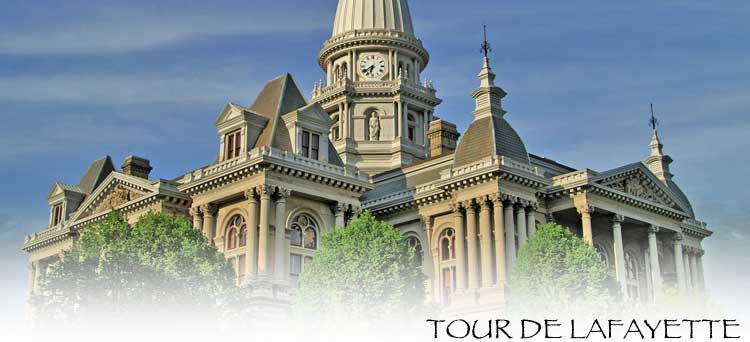
You may take a
virtual tour
of the Historic Centennial Neighborhood. (Be sure to click on the
button with four arrows to watch this in full screen mode!) This
production is from the Tour
de Lafayette, a site for touring nine historic neighborhoods
located in Lafayette, Indiana. The Tour de Lafayette Website has an
entire section devoted to the Historic Centennial Neighborhood --
including its history and a listing of plaque properties. Copies of
the virtual tour are available there as well in formats suitable for
both the Windows Media Player and iPods.

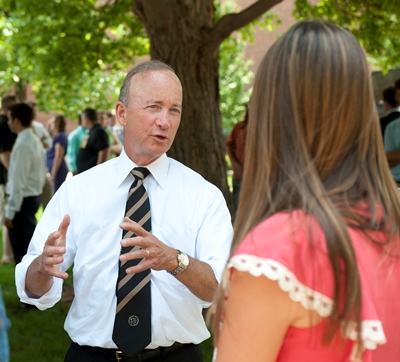 On Monday, June 17, 5:00 - 7:00 pm the Imagination Station, 600
N. Fourth St. hosted a Community Reception Picnic for new Purdue
University President Mitch Daniels. This event was hosted by
Greater Lafayette Commerce and sponsored by several local businesses
and industries.
On Monday, June 17, 5:00 - 7:00 pm the Imagination Station, 600
N. Fourth St. hosted a Community Reception Picnic for new Purdue
University President Mitch Daniels. This event was hosted by
Greater Lafayette Commerce and sponsored by several local businesses
and industries.
Daniels and local officials spoke briefly. Food was
available for community members including pulled pork, hot dogs and
brats.
The atmosphere was casual and
children attended along with their parents.

 The Dulcimer Gathering is a group of mountain dulcimer and hammered
dulcimer players who have been playing together since 1985. They
gather together to learn new songs and to entertain themselves and
others. The Dulcimer Gathering meets in Centennial Park (at the
corner of 6th and Brown in Lafayette, Indiana) June, July, and August
each year. Bring your lawn chairs and come listen. If you are out
for a walk, stop by. You can even bring your dulcimer or other
acoustic instrument and join in!
The Dulcimer Gathering is a group of mountain dulcimer and hammered
dulcimer players who have been playing together since 1985. They
gather together to learn new songs and to entertain themselves and
others. The Dulcimer Gathering meets in Centennial Park (at the
corner of 6th and Brown in Lafayette, Indiana) June, July, and August
each year. Bring your lawn chairs and come listen. If you are out
for a walk, stop by. You can even bring your dulcimer or other
acoustic instrument and join in!
The Dulcimer Gathering is in Centennial Park from 7:00 to 9:00 pm
every Tuesday. In the event of bad weather, the Dulcimer Gathering
will be in the Trinity United Methodist Church Education Building, one
block south of Centennial Park.

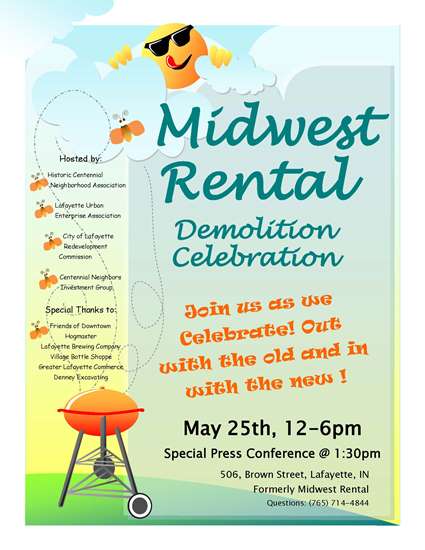 On Saturday, May 25, 2013, 12:00
noon to 6:00 pm there was a celebration at the former Midwest
Rentals site at the corner of Brown Street and 5th Street. This
marked the beginning of the demolition process to make way for the
innovative public/private
Centennial Townhomes
development on that site. Music, food, and beverages were
provided.
On Saturday, May 25, 2013, 12:00
noon to 6:00 pm there was a celebration at the former Midwest
Rentals site at the corner of Brown Street and 5th Street. This
marked the beginning of the demolition process to make way for the
innovative public/private
Centennial Townhomes
development on that site. Music, food, and beverages were
provided.
This event was sponsored by the Historic Centennial Neighborhood Association, the Lafayette Urban Enterprise Association, the City of Lafayette Redevelopment Commission, and the Centennial Neighbors Investment Group. Special Thanks to Friends of Downtown, Hogmaster, Lafayette Brewing Company, Village Bottle Shoppe, Greater Lafayette Commerce, and Denney Excavating.

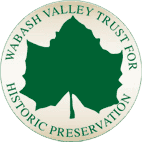 Wabash Valley Trust for Historic Preservation conducted the Toast to
Preservation -- 3:00-5:00 pm, Sunday, May 5, 2013, at the
Moses Fowler House, 909 South Street, Lafayette, Indiana.
Wabash Valley Trust for Historic Preservation conducted the Toast to
Preservation -- 3:00-5:00 pm, Sunday, May 5, 2013, at the
Moses Fowler House, 909 South Street, Lafayette, Indiana.
The public was invited to raise a glass to the efforts of our neighbors to preserve and protect historic structures. This included the Trust's recognition of the "Silk Purse Award", the "Johanna Downie Award", a Historic Plaque Presentation, the announcement of the Endangered Structures list and awards presented by local neighborhood associations. Historic Centennial Neighborhood Association was honored to make three awards:
Pride of Centennial Award
Lafayette Transitional Housing Center
for extensive restoration to the brick exterior
in the Historic Centennial Neighborhood
Pride of Centennial Award
Brenda and Richard Thomas
for rebuilding historic stone wall
in the Historic Centennial Neighborhood
Friend of Centennial Award
Benjamin L. Ross
for uncommon support of Historic Centennial Neighborhood's future.
After all seven awards were given, Michael Hunt made a
short presentation "Transition of Lafayette's Oldest Neighborhood:
Historic Centennial".

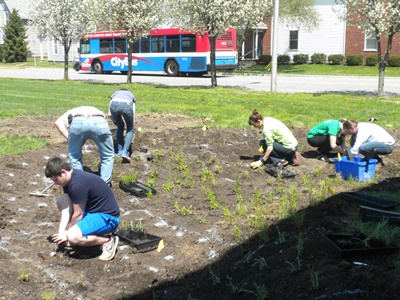
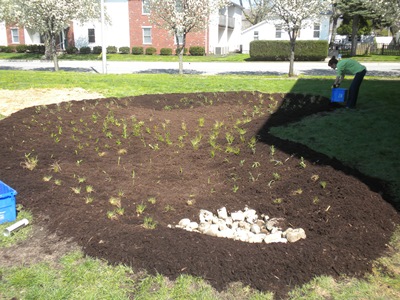
On Monday, April 22, 1:00 - 4:00 pm, members of our neighborhood and the community participated in the installation of a rain garden at Imagination Station, 600 N. Fourth St.
The garden is 300 square feet in size. It is located near the northern end of the building. Purdue students planted designated grasses and flowers. Imagination Station has two downspouts to drain water from the roof of the building. Both are on the west side of the building. The northernmost downspout will be diverted to the rain garden.
The collection of rain/storm water in a rain garden will be the latest activity in Historic Centennial Neighborhood related to diversion of stormwater surges into the Wabash River. The redirection of the 66-inch sewer under Cincinnati Street has been completed and the North Street Reconstruction and Integrated Stormwater Management project is about half complete. It appears that Historic Centennial is the epicenter of stormwater activities.

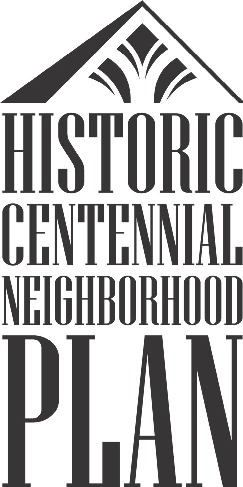 On Monday, December 3, 2012, The Lafayette City Council approved the
Historic Centennial Neighborhood Plan "to provide a long-term vision
for future development, infill, preservation and streetscape
improvement within the Historic Centennial Neighborhood."
On Monday, December 3, 2012, The Lafayette City Council approved the
Historic Centennial Neighborhood Plan "to provide a long-term vision
for future development, infill, preservation and streetscape
improvement within the Historic Centennial Neighborhood."
The
plan is available for viewing
at the Lafayette City Government Website.

 The Historic Centennial Neighborhood
is using a private online network called
Nextdoor Centennial and we
think you'll benefit from joining us. On our Nextdoor site, neighbors
can share community events, recommendations, items for sale/free,
crime/safety concerns, ideas about how to make our neighborhood
better, and more. Please join us to build a better neighborhood!
Neighbors across the country are using Nextdoor to:
The Historic Centennial Neighborhood
is using a private online network called
Nextdoor Centennial and we
think you'll benefit from joining us. On our Nextdoor site, neighbors
can share community events, recommendations, items for sale/free,
crime/safety concerns, ideas about how to make our neighborhood
better, and more. Please join us to build a better neighborhood!
Neighbors across the country are using Nextdoor to:
Visit the Nextdoor Centennial site. You can join us by asking one of the neighbors listed there to invite you or by simply signing up.
New members must verify their addresses to ensure that all members of the website are part of the neighborhood. This helps protect the privacy of everyone on the website so they feel comfortable discussing neighborhood topics and sharing contact information with neighbors.
Similar to Facebook and other social networking sites, Nextdoor's services are free for users. The primary benefit of Nextdoor is that it will help bring our neighborhood together. More connected neighborhoods are safer, stronger, and better places to live.
For more information, contact Jennie Peterson, NSP/DOE Project
Manager, City of Lafayette at jpeterson@lafayette.in.gov or
765-807-1086.

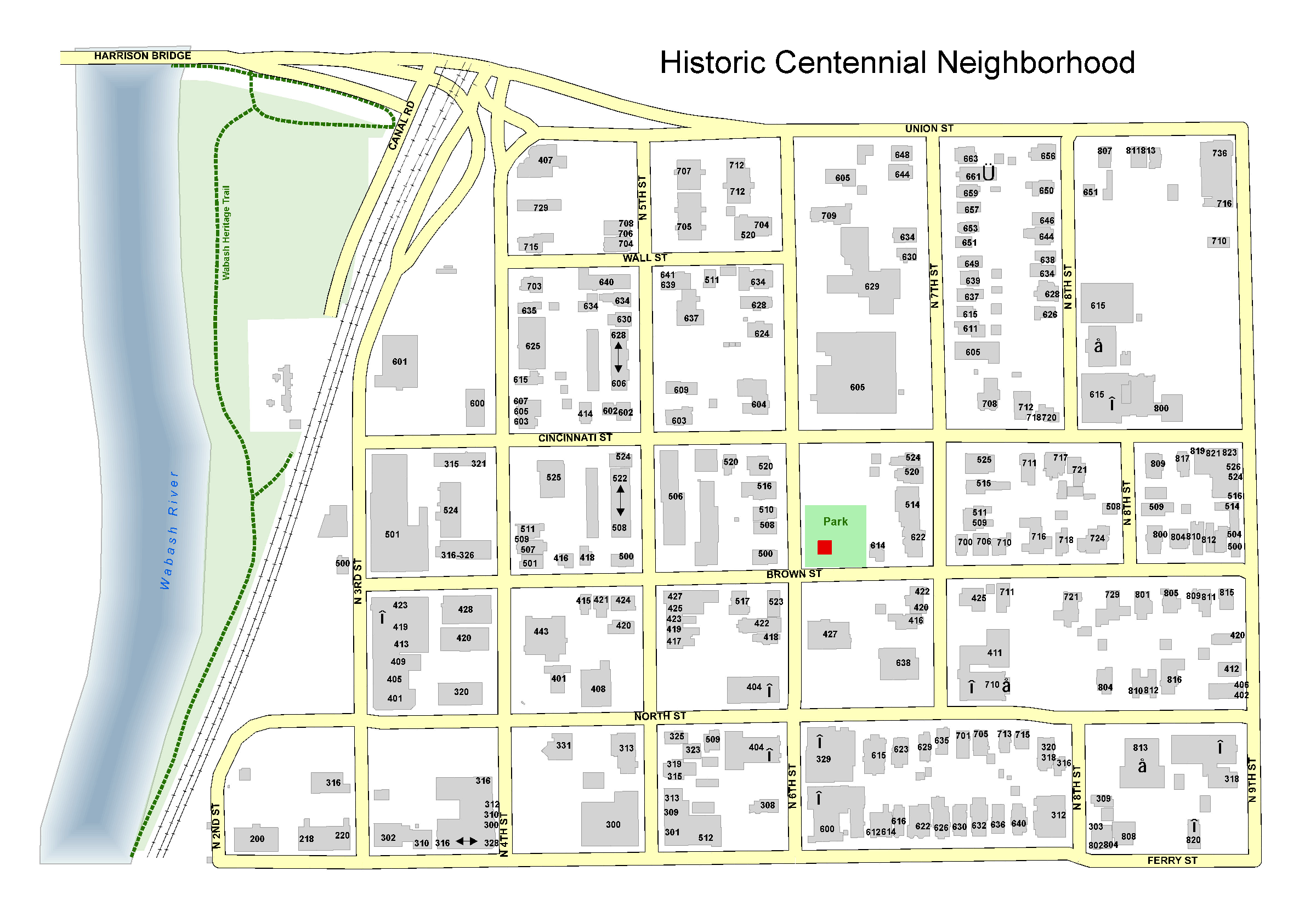 We are very pleased to announce a new feature of this Website -- a Clickable
Map of all the structures in the Historic Centennial Neighborhood!
We are very pleased to announce a new feature of this Website -- a Clickable
Map of all the structures in the Historic Centennial Neighborhood!
In the set of links across the top of this page,
click on the
Places: Architecture of Centennial Neighborhood.
This brings up the page with the clickable map.
Select any structure of interest to you and simply click on its street
number.
This will bring up a page of detailed information about that
structure.

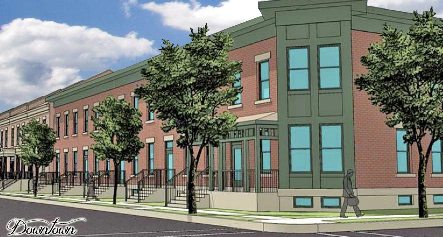 Details on the innovative public/private Centennial Townhomes
development planned for North Fifth Street in the Centennial
Neighborhood near downtown Lafayette are now available on the
project's Website
www.historiccentennialtownhomes.com.
There are also links to Centennial Townhomes newsletters!
Details on the innovative public/private Centennial Townhomes
development planned for North Fifth Street in the Centennial
Neighborhood near downtown Lafayette are now available on the
project's Website
www.historiccentennialtownhomes.com.
There are also links to Centennial Townhomes newsletters!
The community is invited to learn more and to respond to a brief survey posted on the website.
"As we move forward with plans for this project, targeted for a spring 2013 groundbreaking, we need input from the community, potential developers and those who may be interested in living there," said Dennis Carson, director of the Lafayette Economic Development Department. "The survey has just 20 short questions and takes only a few minutes to complete."
The survey was developed and its results will be compiled by StatCom, a Purdue University Department of Statistics student group.
Steven Meyer, chair of the Lafayette Urban Enterprise Board, one of the project partners, said, "Launching the website is an important next-step in solidifying our vision for the North Fifth Street block. Discussing our plans and getting suggestions from others will guide this public/private partnership to its success."
The website also features information on the project partners, neighborhood's history, and points of interest in the Centennial Neighborhood.
"The Centennial Neighborhood has made great strides in re-emerging as a lovely, walkable neighborhood," said Brenda Canaan, owner of Goldstone Jewelry on Sixth Street.
"I encourage the community to check out the plans for the latest project on this new website and learn more about what's coming next," Canaan said. "Technology and a unique cooperation between the Centennial neighborhood and the city are going to truly bring us full circle to renewing the neighborhood to the vibrant, historic days of the late 1800s."
"Intended to complement the neighborhood's historic architecture, homes and setting, the Centennial Townhomes project will be developed by three partners," said Margy Deverall, planner for the city of Lafayette.
They are the City of Lafayette Redevelopment Commission, which is responsible for rehabilitating properties for the city's best social and economic uses; Lafayette Urban Enterprise Association, established in 1993 to enhance, revitalize and encourage neighborhoods and businesses in the city's enterprise zone; and Centennial Neighborhood Investment Group LLC, made up of area residents who are investing their own capital to help purchase the site.
For more information and to complete the survey, visit the website
www.historiccentennialtownhomes.com.

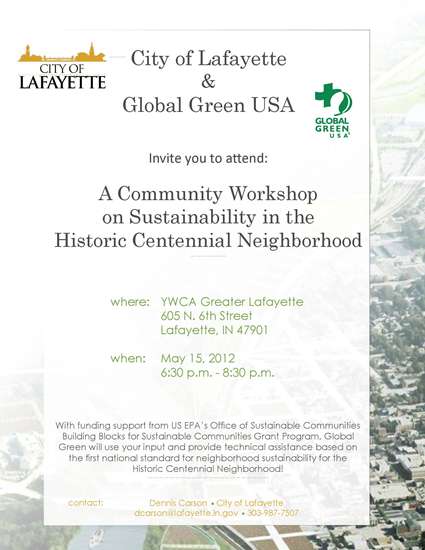 Eight American communities will receive free neighborhood design
consultation in 2012 from Global Green USA with the help of a grant
from the Environmental Protection Agency's (EPA) Building Blocks for
Sustainable Communities Program. Four sustainability experts will
conduct three-day visits to communities and provide comprehensive
recommendations for infrastructure and policy changes aimed at helping
the communities build a future that is more resource-efficient,
livable, healthy, and environmentally responsible.
Eight American communities will receive free neighborhood design
consultation in 2012 from Global Green USA with the help of a grant
from the Environmental Protection Agency's (EPA) Building Blocks for
Sustainable Communities Program. Four sustainability experts will
conduct three-day visits to communities and provide comprehensive
recommendations for infrastructure and policy changes aimed at helping
the communities build a future that is more resource-efficient,
livable, healthy, and environmentally responsible.
Lafayette was one of the eight cities chosen. Lafayette strives to be environmentally sustainable as much as possible. From reducing Combined Sewer Overloads (CSOs) to improving the Wabash River watershed to green buildings that reduce their carbon footprint such as the Economic and Community Development offices at 515 Columbia Street, the City takes these steps not only because it is the right thing to do for the environment but it is fiscally responsible in the long term.
"Working with Global Green USA and the US EPA to implement LEED-ND will add another resource for City planning and neighborhood revitalization," says Mayor Tony Roswarski.
Dennis Carson, Economic Development Director adds, "This opportunity comes to us at the right time as we continue with the Historic Centennial Neighborhood Master Plan with the Tippecanoe County Area Plan Commission and Ratio Architects. We will be able to apply what is learned to the newly acquired Midwest Rental site, the City Business Transfer station and other future projects from infill development to streets and infrastructure."
A meeting with the Global Green TA team for Lafayette Centennial Neighborhood residents was on Monday, May 14, at the City Hall Board of Works room. A public meeting "A Community Workshop on Sustainability in the Historic Centennial Neighborhood" was Tuesday, May 15, at the YWCA.

 In support of its stormwater and street management plan, the City of
Lafayette has chosen to integrate Green Infrastructure Best Management
Practices (GI BMPs) as part of a "complete project" approach for the
implementation of more sustainable urban streetscapes. The North
Street Reconstruction and Integrated Stormwater Management project is
the first of the City's historic brick street improvements to utilize
GI BMPs to minimize the short and long term infrastructure costs while
concurrently creating an aesthetically pleasing urban greenway through
the use of functional integrated stormwater management practices.
In support of its stormwater and street management plan, the City of
Lafayette has chosen to integrate Green Infrastructure Best Management
Practices (GI BMPs) as part of a "complete project" approach for the
implementation of more sustainable urban streetscapes. The North
Street Reconstruction and Integrated Stormwater Management project is
the first of the City's historic brick street improvements to utilize
GI BMPs to minimize the short and long term infrastructure costs while
concurrently creating an aesthetically pleasing urban greenway through
the use of functional integrated stormwater management practices.
Results from the Green Infrastructure Feasibility and Prioritization Study completed in 2010 identified the North Street corridor as providing the best opportunity among the 12 historic brick streets studied to minimize wet weather flows to the combined sewer system through source control. The recommendation was based on several factors including the existing condition of the roadway, planned capital improvements within the area, and the project's ability to cost effectively eliminate the largest volume of stormwater runoff from the City's Combined Sewer Overloads (CSOs).
The City of Lafayette has created a Website for the
North Street Reconstruction and Integrated Stormwater Management
.

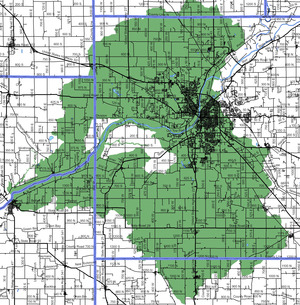
The Wabash River Enhancement Corporation continues to accept applications for their cost-share program. This program will provide up to 75% of the total cost for urban and agricultural projects focused on improving water quality in the region of the Great Bend of the Wabash River watershed. Applications are accepted on a rolling basis. Applications are due by noon the first Monday of each month. Urban projects they fund include Rain gardens, Rain barrels, Pervious pavement, Native plants, Trees, Bioswales, Green roofs, Streambank stabilization, Turf to prairie conversion, Turf to tree conversion, and Infrastructure retrofits. WREC staff will contact you when they receive your application to discuss your project, obtain site plans and photographs, and determine any additional needs to process your application.
If you are interested in the program but are not sure what you should implement or where these practices would fit, contact Sara Peel of the Wabash River Enhancement Corporation at speel@lafayette.in.gov to schedule a site visit.
More information available and applications may be downloaded and submitted here.

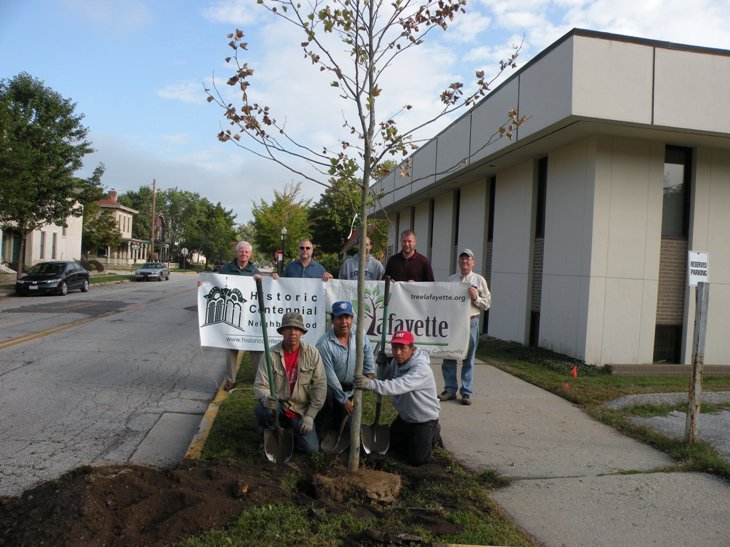

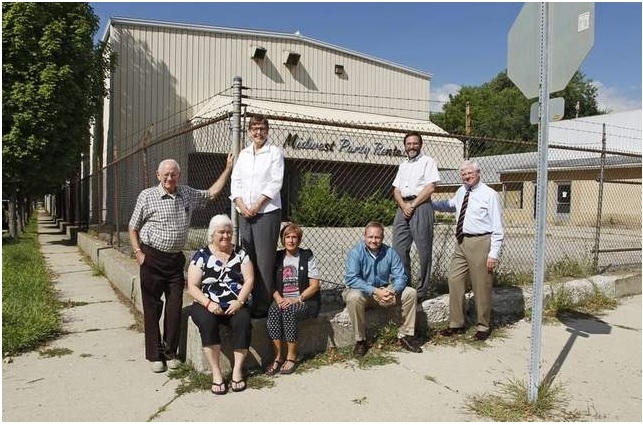 [Centennial neighborhood residents from left, Bill Uerkwitz, Brenda Canaan, Barbara Dixon, KJ Nutt, Bill Bray, Steve Belter and Michael Hunt are eager to see the former Midwest Rentals location become a site for townhouses. / Photo by Michael Heinz/Journal & Courier]
[Centennial neighborhood residents from left, Bill Uerkwitz, Brenda Canaan, Barbara Dixon, KJ Nutt, Bill Bray, Steve Belter and Michael Hunt are eager to see the former Midwest Rentals location become a site for townhouses. / Photo by Michael Heinz/Journal & Courier]
(This article was written by Amanda Hamon and is reprinted from the Lafayette Journal & Courier, August 26, 2011.)
An empty commercial site in Lafayette's Centennial neighborhood soon will undergo a renaissance, thanks to an unconventional partnership between the city, a nonprofit and nearby residents. The former Midwest Rentals Inc. site, at 506 Brown St., now features vacant buildings in the midst of the near-downtown neighborhood.
Residents long have looked for a way to transform the site into housing that would fit the area's architecture and help stabilize the neighborhood, said Michael O. Hunt, president of the Centennial Neighbors Investment Group LLC. "One of the principal hurdles in revitalizing the neighborhood was that property, sitting right at our front door, in the middle of the neighborhood," Hunt said.
Now the investment group -- which consists of 10 Centennial neighborhood property owners -- is putting its money where its mouth is. The group is partnering with the Lafayette Redevelopment Commission and the nonprofit Lafayette Urban Enterprise Association to purchase the site, which stretches about half a block. Each party will pay one-third of the property's $380,000 price tag, said Dennis Carson, the city's economic development director. The groups are buying the property from Jim Andrew, the owner of Henry Poor Lumber Co.
In December, Andrew purchased it and another former Midwest Rentals site near the Wabash River. The deal involved a land swap that saw Midwest acquire the former Henry Poor site on Klondike Road in West Lafayette, Andrew said.
Officials hope to build between 14 and 18 townhouses on the Brown Street site, Carson said. The goal is to keep those homes owner-occupied, and to sell them at the market rate rather than provide them as low-income housing. Centennial residents expressed elation Thursday that the site - which has been vacant about four years - soon could become a vibrant part of the neighborhood.
"This site is absolutely critical to our long-term plan, going forward, to have more owner-occupied housing," said Barbara Dixon, a member of the investment group. "We're willing to invest our own money because we really believe in our neighborhood."
Thursday, the city's redevelopment commission approved adding the Brown Street project to the development plan for the consolidated central tax-increment financing district. The addition to the plan, per state statute, will need to be approved first by the Tippecanoe County Area Plan Commission, which meets in September, and then by the Lafayette City Council, which could get the matter the first week in October, Carson said.
Mayor Tony Roswarski at the redevelopment commission meeting expressed his support of the partnership between the city, the nonprofit group, and the investment group. The fact that residents are willing to use personal funds to see the site redeveloped underscores how invested they are in revitalizing the neighborhood, he said.
"We are extremely excited about what that means," Roswarski said. "I think the impact that this project can have is priceless."
It will take between a month and 45 days for the land acquisition deal to be finalized, Carson said. Although the details of the site's development plan haven't been worked out, Carson said he hopes there will be activity on the site this spring.
Read an editorial that appeared in the Lafayette Journal and Courier September 1, 2011 "Centennial neighborhood steps up big".
Read a second editorial that appeared in the Lafayette
Journal and Courier October 28, 2011
"A new lease on rethinking old neighborhoods".

The Historic Centennial Neighborhood Brochure of important information about the neighborhood has been updated. A PDF file of this new brochure is available for viewing or printing. Please feel free to share this with anyone who is or who might be interested in living in the Historic Centennial Neighborhood.

Historic Centennial Neighborhood is Lafayette's oldest residential and
mixed-use neighborhood. As such, much of the area's sanitary system
consists of problematic storm sewers that empty directly into the
Wabash River (which is the neighborhood's western boundary). There is
concern that much of the paper and plastic litter that is dropped on
the neighborhood's streets and sidewalks washes into the storm sewers
and thus into the Wabash.
Historic Centennial Neighborhood Association (HCNA) plans to involve
neighborhood elementary school students in an applied science project
to systematically survey the streets and sidewalks of the neighborhood
to quantify and characterize the potential litter input to the river.
With the problem defined, the students would then be directed to
design an educational program to eliminate/reduce the trash flow to
the river.
A free-will offering from the Friday, November 5, 2010 First Baptist
Church-sponsored Vox Reflexa choral program will be used by HCNA to
purchase study supplies for the students, e.g., gloves, buckets,
reflective vests, trash grabbers and scales. First Baptist Church is
located in Historic Centennial Neighborhood. Thus, First Baptist
Church is contributing to a unique neighborhood-based effort to help
the Wabash River Enhancement Corporation (WREC) improve water quality
in the Wabash River.
May 2011 Update: Graduate students in the Purdue Department of
Statistics' "Statistics in the Community" outreach program are in the
process of helping design a statistically-based sampling plan for the
elementary school students to implement in order to determine the
geographical and temporal distribution of litter on the streets and
sidewalks (surfaces) of the neighborhood. The graduate students
involved will be on campus through the summer of 2011, so the planning
will continue. It is likely that the HCNA Planning Committee will
meet with the Statistics students (led by Jeff Li) during this period
with a goal of starting the project in the Fall 2011 school term. If
you would like to help or to be involved with this project in any way,
please contact Michael O. Hunt, 765-742-6704, huntm@purdue.edu.

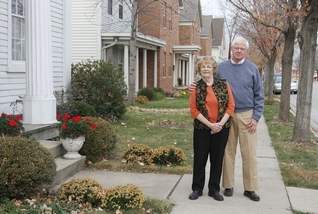
On Thursday, November 18, 2011, an Historic Centennial Neighborhood Plan Steering Committee was formed. Duties of the Steering Committee will include assisting with the development of neighborhood goals and objectives and providing direction and feedback on a design and development framework for future growth and redevelopment. Sallie Fahey, executive director of the Area Plan Commission, said the 20-member committee will meet up to six times as the plan is prepared. The committee also will serve as the primary conduit of information for the rest of the neighborhood. Fahey said the entire planning process may take up to a year to complete.
Here is the current composition of the master plan Steering Committee:
| Category | Representative(s) |
|---|---|
| Historic Centennial Neighborhood Association | Barbara Dixon and Michael O. Hunt |
| Schools | Sr. Lenore Schwartz, Principal, St. Boniface School |
| Churches | Dean Knudsen, First Baptist Church |
| Apartment Owners -- 10 units or more | Julie Ginn |
| Apartment Owners -- fewer than 10 units or converted home | Brenda Canaan |
| Residential Tenant or Purdue student | Stewart Fresca |
| Business Property Owner | Del Bartlett |
| Business Owner-Tenant | Dawn Ross |
| Owner of Land Ripe for Redevelopment | William Bray |
| City Council District 2 | Ron Campbell |
| City Council District 3 | Perry Brown |
| Social Service Organization | To be announced |
| Arts/Museum Organization | David Raymer, Tippecanoe Arts Federation |
| Area Plan Commission | To be announced |
| Wabash River Enhancement Corporation | Gene Hatke |
| CityBus Board | Jon Fricker |
| Ivy Tech State College | Andrew Antonio |
| Purdue Research Foundation / Office of the University Architect | John Collier |
| Homeowner | Catherine Hill |

The Historic Centennial Neighborhood Association (HCNA) has recently
sent letters of support concerning the Wabash River Enhancement
Corporation (WREC) watershed implementation project and to
CityBus/WREC for the design of the Brown Street bicycle and pedestrian
bridge. The
letter for the WREC project expresses our support for
and commitment to the proposed Region of the Great Bend of the Wabash
River watershed implementation project proposal being submitted by the
WREC. We plan to contribute $12,000 in in-kind service while serving
on the steering committee, helping promote urban practices throughout
the neighborhood, and through development of an urban waste
quantification project with WREC.
The letter for the
bridge grant proposal expresses our support to fund the design of
the Brown Street bicycle and pedestrian bridge. We understand the
bridge design and its implementation would be sensitive to the two
historic buildings at 500 North 3rd Street -- the brick office
building and the lumber shed/storage building.
Both letters were written by HCNA President Phyllis J. Hunt and
approved at the August 18 HCNA Board meeting.

Elizabeth Mork's home 657 N. 7th has been awarded a Trust plaque as recognition for its outstanding preservation.

Back in 2005 the Historic Centennial Neighborhood Association (HCNA) began laying the groundwork for the redevelopment of Centennial Park. Built on the location of the former school from which the neighborhood was named, the park was showing its age and was under-utilized by the area's youth. The City of Lafayette and its Parks Department developed a method for local residents to assist in creating a vision for how the community parks should function and appear. This planing process resulted in this Master Plan which was unanimously approved on March 21, 2006 by the Lafayette Park Board of directors. Take a look at the new Centennial Park

The Historic Centennial Neighborhood lies just north of the commercial district in Lafayette Indiana. The neighborhood includes areas of the original plat of Lafayette from 1825, additional lands platted in 1829 as the Bartholomew and Davis Addition to the city of Lafayette, as well as other smaller plats. The neighborhood encompasses the region from Ferry St north to Union St, and 9th St west to the Wabash river. The neighborhood grew rapidly after the Wabash and Erie canal was built in 1843 along its western border, and again with the arrival of the railroad, which ran down the center of 5th street.

The Historic Centennial Neighborhood of Lafayette, Indiana takes its name from the Centennial School which was located at Sixth and Brown before being torn down in 1971. The building was completed in 1876, the year of the United States Centennial. Thus, the neighborhood's name is firmly rooted in the history of the area and the nation. If the name of the neighborhood goes back a long way, so do many of the structures which include some of the oldest in the city. Although some of the older homes have been lost over the years, many fine buildings have survived.
In the mid-1800's, the area north of Ferry street developed into a wealthy residential neighborhood inhabited by merchants, railroad executives, lawyers, and doctors. Today, Centennial is a relatively small neighborhood of stately old homes, churches, institutions, and local businesses. A walk along the streets of our historic neighborhood can evoke the visual experience of life in a centralized railroad town of the 1880's.

The Historic Centennial Neighborhood Association (HCNA) is an organization of individuals who are interested in the future of the Centennial Neighborhood Historic District. Membership is open to all: property owner, renter, home-owner, institution, and business. HCNA's mission is to preserve and enhance the quality of life in Lafayette's oldest residential and mixed-use neighborhood, thereby making it a destination place to live and work. In carrying out its mission, HCNA's goal is to increase the portion of owner-occupied housing in the mix of residential units thus revitalizing the neighborhood.

In 1983, the Centennial Neighborhood was designated a National Historic District and was placed on the National Register of Historic Places.
It contains examples of most of the architectural styles found in the town. As one of Lafayette's oldest neighborhoods, it contains many significant religious and educational institutions as well as homes associated with early prominent citizens.
The area was first developed during the 1830s as Lafayette's boundaries expanded north and east from the Wabash River. In 1843 a period of growth began as the Wabash and Erie Canal was opened along the district's western edge. The resulting commercial growth along its path included mills, warehouses and wharves.
The coming of the town's first railroad in 1853 quickly put an end to the Canal. During the next three decades as Lafayette experienced tremendous physical and economic growth, the Centennial District took on much of its present appearance.